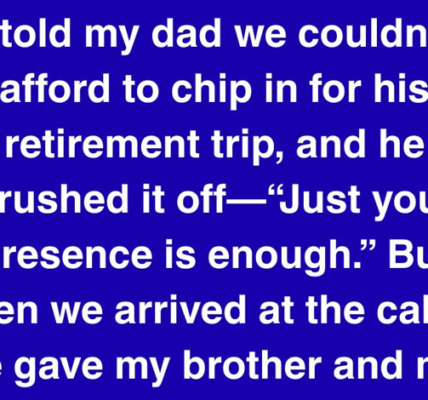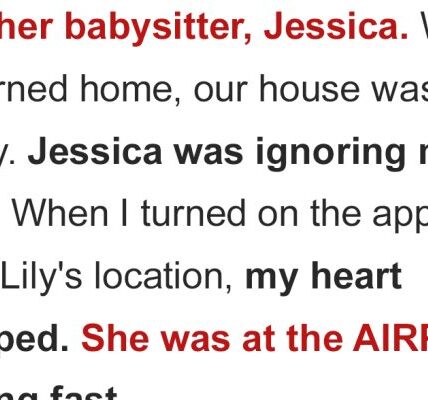I picked up my niece from daycare like always, her curls sticky with applesauce and glitter glue. As we buckled in, her teacher handed me a sealed envelope marked “urgent.” I opened it at a red light and my hands shook. Inside was a drawing, and in thick crayon it read: “My uncle told me to never say…”
For a split second, I felt the air leave my lungs. My grip tightened on the steering wheel, and I looked back at her in the rearview mirror. She was quietly humming, legs swinging, totally oblivious to the weight of the note in my hands.
I pulled into the nearest gas station and parked. My heart pounded as I took the drawing out again. It was a crude crayon sketch—stick figures, a couch, a TV, and a tall man holding a finger to his lips. The words “don’t tell anyone” were scribbled beside him.
I knew I wasn’t that uncle.
I’m her mom’s brother—“Uncle Raj”—but my sister Divya also has a brother-in-law from her husband’s side. His name is Reggie. Reggie’s always been a little… off. Too friendly with kids, too many tickles, always volunteering to babysit. I’d told Divya before that something about him gave me a weird feeling, but she brushed it off. “He’s just playful,” she said.
Now, staring at that drawing, I felt a knot in my stomach. I didn’t want to believe it. But I also couldn’t ignore it.
“Hey sweet pea,” I said gently, turning around in my seat, “what’s this picture about?”
She squinted at it and shrugged. “It’s just pretend,” she said quickly. Too quickly.
“Did someone tell you to say that?”
She shook her head and looked out the window.
That night, I called my sister after putting my niece to bed. I told her everything—the envelope, the drawing, her reaction. Divya was silent for a long time. Then, in a low voice, she said, “Raj… she’s been having night terrors lately. And she wets the bed. I thought it was just a phase.”
My heart sank.
Divya and her husband, Malik, lived in the suburbs, about 45 minutes from me. Reggie, Malik’s younger brother, had been crashing at their place off and on while “figuring things out,” which apparently meant changing jobs every two months and sleeping in the basement.
Divya asked me not to confront anyone yet. “Let me talk to her pediatrician and see what she says,” she pleaded. I agreed—but only if she promised not to leave her daughter alone with Reggie, not even for a minute.
The next day, Divya kept her word. She called the pediatrician, who then looped in a child psychologist. Over the next few weeks, my niece went to several appointments. She was hesitant at first but slowly started talking more.
One night, Divya called me crying.
“She said… she said Reggie comes into her room sometimes at night. That he tells her it’s a game and that she can’t tell Mommy or she’ll get in trouble.” She sobbed. “I feel so sick.”
I told her it wasn’t her fault. But she had to act.
Divya finally confronted Malik. He didn’t want to believe it. “Reggie’s not like that,” he kept repeating. But when he saw the drawing and heard what their daughter said in therapy, he went quiet.
He asked Reggie to leave immediately.
But here’s the twist—Reggie refused. Claimed it was a misunderstanding, even accused Divya of turning the kid against him. He said, “I’ve done nothing wrong, and I’m not leaving.”
That was when I stepped in.
I showed up the next day while Malik was at work. Reggie opened the door in boxers and a hoodie, like he owned the place. I kept my cool but made it clear: “Pack your stuff. You’ve got one hour.”
He laughed. “Or what? You’ll call the cops?”
I didn’t answer. I just walked past him, straight to the basement. I grabbed a trash bag and started chucking his things in. Reggie shouted, called me names, said I had no proof.
“Then you won’t mind a visit from child services,” I said flatly.
That shut him up.
He left that night.
Divya and Malik filed a restraining order. Their daughter’s therapy sessions continued, and slowly, she began to smile more. She still had nightmares sometimes, but the bedwetting stopped.
But the story didn’t end there.
A month later, Reggie’s name popped up in the news.
He’d been arrested—caught in a sting operation targeting men who preyed on minors in online chatrooms. The report mentioned that he’d arranged to meet who he thought was a 13-year-old girl. Instead, it was an undercover officer.
Divya called me sobbing again, but this time with relief. “He’s gone, Raj. He’s finally gone.”
It was a gut-punch to know he’d probably hurt other kids. But there was also a sense of karmic justice. He thought he could talk his way out, charm his way through, and just move on to the next opportunity. Instead, he landed in jail.
At his trial, the prosecutor called Divya’s daughter’s drawing “a key piece of supporting evidence in establishing a pattern.” That little crayon sketch helped make sure he wouldn’t harm anyone else.
Malik apologized to his daughter in front of the whole court. “I should’ve believed you sooner,” he said through tears. “I’m sorry.”
After the trial, we all took a deep breath.
Life started to feel normal again. Not the same as before—but safer. My niece went back to dance class. Divya started working part-time again. Malik became extra attentive, never missing a school pickup or bedtime story.
One sunny Saturday, I took my niece out for pancakes.
As we sat at a window booth, she looked up and said, “Uncle Raj? Can you help me draw something?”
“Of course,” I smiled.
She handed me a crayon. “I want to draw a superhero. One that tells the truth and helps kids.”
So we did.
She made the cape blue. I added a gold badge. And right there in syrup-sticky fingers and a hopeful grin, I saw her healing.
I’ll never forget that first drawing—the one that started it all. It shook me to my core. But I’m grateful for it too. Grateful that a little girl trusted paper and crayon when she couldn’t find the words.
Here’s the thing: kids often don’t tell you in plain language when something’s wrong. They leave breadcrumbs—in their behavior, their drawings, their silence. And it’s our job to follow them.
That’s the lesson I carry now: Always listen when a child tells you something—especially when they don’t say it out loud.
Thanks for reading. If this story moved you, please share it. You never know who might need to hear it today



